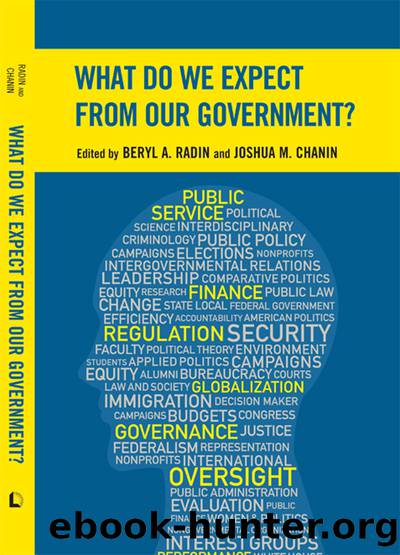What Do We Expect from Our Government? by unknow

Author:unknow
Language: eng
Format: epub
Publisher: Lexington Books
Published: 2010-08-15T00:00:00+00:00
Inventiveness
The United States is itself a marvelous invention. Every one of its institutions and procedures was invented. The same spirit of inventiveness informs immigration law and policy and can help us navigate our way to a better future. This section begins with two inventive immigration programsâone already well-established, the other being pilotedâand continues with a starter list of ideas that could become pilots or experiments.
Inventiveness: Diversity Visa Program
When the U.S. Select Commission on Immigration Policy was considering policy alternatives, one of the guiding ideas involved portfolio diversification. The national interest called for immigrants from many backgrounds, with a range of experiences. The heavily family-oriented nature of immigrant visa allocation tended to âbring more of the same.â Moreover, there was a noticeable lack of immigration from Africa, and many Commission voices sought to strengthen the flow from Africa. Further, progressive waves of blood kin would have less of the energy and courage of pioneer immigrants.
Eventually, the Commission hit upon a lottery system to simultaneously diversify the immigrant flow, provide visas to persons from Africa, and enrich the pool with new pioneers. After some experimentation, the Immigration Act of 1990 established the Diversity Visa Program, which provides 55,000 visas annually (reduced since 1999 to 50,000 in order to provide 5,000 visas to the NACARA program), allocated by lottery, to applicants from countries underrepresented in recent immigration flows and their spouses and minor children; âunderrepresentedâ is defined as having fewer than 50,000 LPRs in the last five years.
Today the Diversity Visa Program is flourishing. Since the fall of 2003, application has been electronic, on the internet. Since 2003 the number of applications hovered around 6 million annually, but in the fall of 2007 it jumped to 9.1 million and in the fall of 2008 to an unprecedented 13.6 million, presumably as internet use has increased around the world. As expected, the Diversity Visa Program has substantially increased the flow of immigrants from Africa. In the period 2001-2008, the proportion of Africa-born of all diversity-visa admissions to legal permanent residence ranged from 35.2 percent in 2005 to 45.8 percent in 2007 (U.S. INS and U.S. DHS, Yearbook of Immigration Statistics, 2001-2008).
Inventiveness: MAVNI Program
Private firms are not the only ones seeking personnel from abroad. After months of deliberation, the Department of Defense announced a pilot program intended to recruit soldiers with three main types of needed skillsâmedical, language, and cultural. The Military Accessions Vital to National Interest (MAVNI) pilot program begins with a small experiment, recruiting about 300 medical professionals and 550 speakers of 35 languages (including Arabic, Chinese, Hindi, Kurdish, Pashto), for a total of 1,000 recruits. Depending on the experience with the pilot, the program may be substantially increased.
Inventiveness: Starting a List of Ideas
1. Future immigrants, learning English, and becoming Americansâfuture LPRs in the visa waiting list abroad. As noted above, there are long waiting lists for numerically-limited visasâalmost three million persons worldwide in the family preferences alone (Visa Bulletin, March 2009). Some of these future LPRs are probably already in the United States, either on valid nonimmigrant visas or illegally.
Download
This site does not store any files on its server. We only index and link to content provided by other sites. Please contact the content providers to delete copyright contents if any and email us, we'll remove relevant links or contents immediately.
The Five People You Meet in Heaven by Mitch Albom(2853)
Name Book, The: Over 10,000 Names--Their Meanings, Origins, and Spiritual Significance by Astoria Dorothy(2500)
Real Sex by Lauren F. Winner(2487)
The Holy Spirit by Billy Graham(2433)
The Secret Power of Speaking God's Word by Joyce Meyer(2264)
0041152001443424520 .pdf by Unknown(2230)
How The Mind Works by Steven Pinker(2228)
ESV Study Bible by Crossway(2146)
Ancient Worlds by Michael Scott(2113)
The Meaning of the Library by unknow(2079)
The Gnostic Gospels by Pagels Elaine(2040)
Churchill by Paul Johnson(2019)
MOSES THE EGYPTIAN by Jan Assmann(1981)
The ESV Study Bible by Crossway Bibles(1964)
Jesus by Paul Johnson(1895)
Ancient Near Eastern Thought and the Old Testament by John H. Walton(1857)
The Nativity by Geza Vermes(1855)
The Complete Dead Sea Scrolls in English (7th Edition) (Penguin Classics) by Geza Vermes(1852)
City of Stairs by Robert Jackson Bennett(1842)
